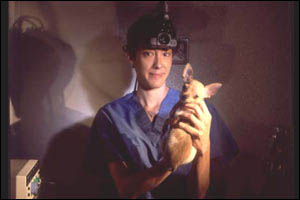| Urban Strategist |
|
|||
| Opthalmology | |||
|
Sheri Berger Board-certified ophthalmologist Manhattan Veterinary Group 240 East 80th Street (212-988-1000) Sheri Berger treats all kinds of animal eye conditions; she has, on occasion, fitted a pet for contact lenses. But most of her day is spent dealing with common infections, cataracts, and glaucoma. Resembling a tall and lanky Winona Ryder, Berger, 38, comes from a horse-racing family; at one point in college, she considered becoming an equine orthopedic surgeon. But ophthalmology batted its eyes at her in vet school. At the MVG, where Berger has been the medical director for three years, she sees mostly dogs and cats. Certain breeds, she notes, are more prone to eye conditions, like Shih Tzus, cocker spaniels, and chows. However, all city animals must contend with particularly urban ailments. "Pollution and dirt make infections harder to manage," says Berger. "But there are also fewer exacerbated cataracts in New York because of the tall buildings and lack of UV light." |
|||
One High Maintenance Hound... Trooper, past the upper limit of his life expectancy, is the definition of high-maintenance: He has intimate relationships with six veterinary specialists at a cost of almost $1,000 per month. Read Trooper's story >>> |
|||
| Richard
Greene Board-certified surgeon Center for Veterinary Care 236 East 75th Street (212-734-7480) Monday-Wednesday only In practice for more than 35 years, Richard Greene trained most of the other surgeons on New York's list during his fifteen years at the AMC. He's one of the few board-certified surgeons who also see general cases, at the cheery Center for Veterinary Care as well as at the ASPCA on Thursdays and in Park Slope at Animal Kind Veterinary Hospital on Fridays. At the ASPCA, he performs as many as fifteen spay-neuters a day. Lately, he's been doing a lot of colectomies on a referral basis for cats with chronic constipation. "In New York, we spend so much intimate time in close confinement with our animals," says Greene. "People will come in with pages and pages of notes on their cat's defecation. It's nice to be able to tell them that you can help." As for dogs, Greene explains that as different breeds become more popular, "we start seeing more of the diseases that dogs get." Currently, that means a lot of Labs with orthopedic (elbow and knee) problems and cocker spaniels -- "they seem to be back" in vogue, he notes -- with skin and ear troubles. Amy Kantor Kantor repaired her hip and fixed the femurs with pins. "Now she needs a home," says Kantor. She believes the dog could not have sustained such injuries from a simple fall. Because West Chelsea is not a hospital with many specialists, Kantor performs general (as well as orthopedic) surgery -- from spaying and neutering to removing tumors to reconstructing the nostrils of pugs and bulldogs. Joint problems dominate the orthopedic sector of her practice, including at least one anterior-cruciate-ligament-tear (ACL) surgery a week (the widespread knee operation that also puts humans under the knife). Kantor, who has been practicing in the city for three years, says that she'll treat "anything with fur but nothing with feathers." She's up for cold-blooded challenges, however. "It's tough to monitor a reptile under anesthesia," she says. "You think it's dead."
Jane Kosovsky Most of Kosovsky's work comes from general practitioners who call her in for surgeries that they don't perform. "As veterinary medicine becomes more specialized," Kosovsky says, "GPs are not doing as much surgery. We do know that the skill of the surgeon is important in the outcome, so people have gotten a lot smarter in choosing someone who operates five days a week." Arnold Lesser Lesser performs a complicated reconstructive surgery, used mainly on people, to help dogs with growth-plate problems, which cause one leg to be shorter than the others. The arduous process, developed by a doctor in Siberia during World War II, involves cutting the bone and then slowly lengthening it, a millimeter per day. Total hip replacement and arthroscopic surgery -- another procedure developed for humans and newly available for dogs and cats -- are also specialties of Lesser's. "These areas are blossoming within orthopedics," Lesser says. And his next new interest is in physical therapy, which may include putting animals on treadmills immersed in water. Thomas Scavelli
"Every patient we see comes in from another vet, so they're all high-risk, intense cases," says Scavelli, who used to run a surgical unit at the Animal Medical Center. The most common procedure he performs is knee reconstruction for ACL tears in dogs. "One thing that's specific to the city is the syndrome of high-rise cats," Scavelli says -- cats that have fallen from windows or balconies, fracturing legs or hips. Scavelli also does a lot of hip replacements for dogs. "We've had dogs in here that were dead lame or chronically in pain. We did an artificial joint, added a titanium implant, and they were using that leg a week or two after surgery."
|
|||
|
|
|||
